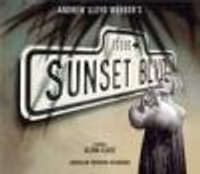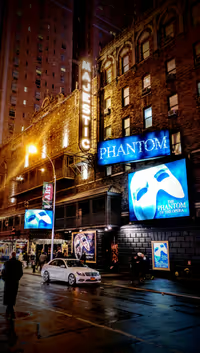Hilty & Simard to lead DEATH BECOMES HER in Chicago spring 2024; Broadway in the fall
#400Hilty & Simard to lead DEATH BECOMES HER in Chicago spring 2024
Posted: 5/16/24 at 8:20am
DaveyG said: "Curious to hear from BalconyClub: have there been any more substantial changes in the score besides the one new song?"
Though there are no noticeable changes to the score, there do seem to be more secondary flourishes: an occasional beat of a tambourine - likely a synthesizer - and mallet bells and short trumpet licks.
But the icing notes may have been on the cake from the beginning. Maybe the pit microphones have been repositioned or a dial on the sound board slightly twisted right or inched up.
Though there isn’t an overture, I like the introduction of select passages ahead of the actual numbers.
After Helen has landed at the wedding, you soon hear the cello foreshadowing the melody of MADELINE’S BEEN ON MY MIND.
When Helen meets up with Ernest at her book signing at Meryl’s, you hear the seven notes of LET’S RUN AWAY TOGETHER - the duet that happens in the next scene.
The Vegas-style FOR THE GAZE returns as a poignant cemetery coda, as Madeline and Helen acknowledge their ending. It’s the same tune, but without the razzmatazz.
Meanwhile, in the marriage scene, the wedding party has been moved downstage. The 5 bridesmaids and 5 groomsmen are also parallel to the audience instead of angled.
The Wednesday matinee sponsor was SLIM JIM - snap into a Slim Jim. (per a house usher) The evening sponsor was APPLEBEES - eatin’ good in the neighborhood.
Swing Johanna Moise filled in for Ensemble player Diana Vaden.
A new line for Ernest, said to Madeline: “Well if it isn’t the bipolar express.”
#401Hilty & Simard to lead DEATH BECOMES HER in Chicago spring 2024
Posted: 5/17/24 at 1:40am
Any word on a new discount code now that SECRET is no longer working?
#402Hilty & Simard to lead DEATH BECOMES HER in Chicago spring 2024
Posted: 5/17/24 at 7:39am
jpbran said: "Any word on a new discount code now that SECRET is no longer working?"
https://hottix.org/shows/cadillac-palace-theatre/death-becomes-her-2/
Enter HOTTIX in code box.
#403Hilty & Simard to lead DEATH BECOMES HER in Chicago spring 2024
Posted: 5/17/24 at 8:37am
Hottix just says “The code you entered is correct, but there are no more tickets available.” Thanks tho!
#404Hilty & Simard to lead DEATH BECOMES HER in Chicago spring 2024
Posted: 5/17/24 at 9:19am
I just tried several dates and both SECRET and HOTTIX worked for all of them. SECRET and HOTTIX both have only ever worked for certain days and certain seats.
#405Hilty & Simard to lead DEATH BECOMES HER in Chicago spring 2024
Posted: 5/17/24 at 10:19am
Thursday night's wedding sponsor was HOME DEPOT - How Doers Get More Done.
At the end of the show during bows, when Hilty and Simard rambled downstage, Simard motioned to Swing Zach Williams to join them. Such class!
Though Williams had already had his own solo bow, it was beautiful for the divas to invite Williams to the spot in between them for another bow.
Williams filled in for the usual Viola mansion host Taureen Everett. Whereas Everett oozes sultriness, Williams oozed backstage cattiness. LOVED IT.
#406Hilty & Simard to lead DEATH BECOMES HER in Chicago spring 2024
Posted: 5/17/24 at 6:29pm
I was thinking about some of the discussion here about to what degree the film and/or musical embodies camp or camp aspects. I was wondering how people define "camp"? Then I accidentally came across this article titled "The Queer Immortality of Death Becomes Her", which I thought was interesting and I thought I'd share: https://www.pastemagazine.com/movies/meryl-streep/death-becomes-her-queer-immortality
I'm especially curious about what you all think about this quote: "Death Becomes Her is a queer film, but not necessarily a campy film. That’s because it doesn’t draw any attention to the production of queer labor, which is to say it neither labors queerly nor highlights the labor of queers, either of which first needs to be present before camp can take root."
OhHiii
Broadway Legend Joined: 4/30/16
#407Hilty & Simard to lead DEATH BECOMES HER in Chicago spring 2024
Posted: 5/17/24 at 6:41pm
The movie is camp. Pure camp. It’s not up for debate.
#408Hilty & Simard to lead DEATH BECOMES HER in Chicago spring 2024
Posted: 5/17/24 at 8:07pm
OhHiii said: "The movie is camp. Pure camp. It’s not up for debate."
I agree. Everyone in the film is indeed playing up their performances. Even in somber moments, there’s an extra coating being played. They’re all definitely “camping” it up.
#409Hilty & Simard to lead DEATH BECOMES HER in Chicago spring 2024
Posted: 5/17/24 at 10:19pm
MadAboutTheBoy said: "
I'm especially curious about what you all think about this quote: "Death Becomes Heris a queer film, but not necessarily a campy film. That’s because it doesn’t draw any attention to the production of queer labor, which is to say it neither labors queerly nor highlights the labor of queers, either of which first needs to be present before camp can take root.""
I genuinely don't really know what the writer means here to explain why they think it's not camp (to be honest, the entire piece uses a lot of words to say a little).
Showface
Broadway Legend Joined: 6/25/14
#410Hilty & Simard to lead DEATH BECOMES HER in Chicago spring 2024
Posted: 5/19/24 at 11:16am
https://www.broadwayworld.com/article/VideoPhotos-First-Look-At-Megan-Hilty-Jennifer-Simard-More-in-DEATH-BECOMES-HER-20240518
Looks fab! LOVE Megan in this clip especially
MidWestTheater
Understudy Joined: 9/26/22
#411Hilty & Simard to lead DEATH BECOMES HER in Chicago spring 2024
Posted: 5/19/24 at 1:30pm
Caught this last night and I had a blast. Not a great show, but so much fun while you're immersed in it. As most have said on this board, both Meghan Hilty and Jennifer Simard are SLAYING these roles. It looks like they are having so much fun and are playing off each other beautifully. Personally loved Meghan's soliloquy towards right after the book party. And of course Jennifer Simard's deadpan line deliveries are killer. I gotta say I thought Michelle Williams was fine, the girl can sing and she looks like she's 20 years old, so kinda perfect for that role. Not a great actress, but didn't bother me.
Unfortunately, this is one of those musicals where the book is superior to the score. Marco Pennette has written a very funny book, especially the first act, that remains close to the original material, but is still it's own piece. In kinda of slows down in the second act, but I felt that in the film as well, once Madeline and Helen team up to get Ernest. The score, I honestly can't remember any number from this show, which was the opposite way I felt with the other zany Chicago out-of-town premiere, Boop!.
For those who don't care for minimalist design in their broadway offerings, happy to report there are sets aplenty in this production and they look amazing. Would love to see a revival of Sunset Boulevard in Madeline Ashton's mansion. (yes, there is a Sunset Boulevard joke) The costumes are stunning, especially the ensemble's nude, black tight feel. I know some people felt the "effects" felt cheap, I dug em, they didn't bother me and I thought they worked. Also, the dancer who falls down the stairs, needs the Gypsy Robe next year. That was an unbelievable and thrilling piece of stunt work, that I am sure will be talked about by everyone in NYC come this fall.
singer234
Broadway Star Joined: 8/31/08
#412Hilty & Simard to lead DEATH BECOMES HER in Chicago spring 2024
Posted: 5/19/24 at 1:58pm
Natalie also would have likely had the option to transfer with Great Gatsby had she not gotten this gig-she certainly isn't lacking for work!
I'd love to see Haven Burton standby for these two, though it would be nice to see Kate Rockwell play an adult reckoning with preserving their youth, considering up until a few years ago she was playing teens!
#413Hilty & Simard to lead DEATH BECOMES HER in Chicago spring 2024
Posted: 5/19/24 at 2:20pm
Should we be expecting reviews this evening?
#414Hilty & Simard to lead DEATH BECOMES HER in Chicago spring 2024
Posted: 5/20/24 at 2:01am
Here’s one from Chris Jones.
Chris Jones Review
#415Hilty & Simard to lead DEATH BECOMES HER in Chicago spring 2024
Posted: 5/20/24 at 7:12am
Saturday evening's "sponsor" for the wedding was Bounty - The Quicker Picker Upper. That one got a howl.
DaveyG
Broadway Star Joined: 8/11/05
#416Hilty & Simard to lead DEATH BECOMES HER in Chicago spring 2024
Posted: 5/20/24 at 8:28am
Menken Fan said: "Here’s one from Chris Jones.
Chris Jones Review"
Mixed from Jones.
Review: ‘Death Becomes Her’ has retro comedic charm but needs more emotional connection"
The 1992 Robert Zemeckis movie “Death Becomes Her” is the kind of wild, slightly unhinged thriller-satire of Hollywood divas, plastic surgery and the cult of youth that would never get made today, and more’s the pity. It not only grossed $150 million, its famous special effects became a staple of hoot-and-holler gay bar video screens replaying Meryl Streep’s discombobulated noggin and Goldie Hawn’s shot-through body with its peek-a-boo hole. Ah, the days before ubiquitous digital manipulation spoiled all that fun forever.
Now comes the movie-into-musical, which opened Sunday night in its Chicago tryout in advance of a fall Broadway berth with the boffo Broadway stars Megan Hilty and Jennifer Simard as the two frenemies Madeline and Helen, one a fading actress, the other a jealous writer. They get mixed up with the same weasel-like plastic surgeon (Christopher Sieber) as well as with Michelle Williams’ Viola Van Horn, a sorceress who promises the two scheming women eternal youth.
This clever show was written by Marco Pennette and directed and choreographed by Christopher Gattelli, and features music and lyrics from the very talented newcomer team of Julia Mattison and Noel Carey. It has some crowd-pleasing strengths, including a genuinely funny book, a swirling, retro, filmic score that features a knockout two- pronged 11 o’clock number for Hilty and Simard, and its best numbers put you in mind of Burt Bacharach and John Barry (no Ingrid Michaelson-like experiments here to confound future Tony Award nominators). There’s a lush physical production from set designer Derek McLane in an old school, drape-heavy “Producers”-like mode and a stellar cast. (Most unusually for this size of Broadway musical, there are just four designated principal roles, so the talented members of the ensemble surely earn their paychecks.) But there’s much work to be done overall if the show is to appeal to people who don’t have prior affection for the source.
The main problem is that the love-hate relationship between the two stars is pivotal and you lose track of it somewhere toward the end of the first act. The thread takes far too long to re-engage, partly because the rules of the show keep changing when it comes to, say, the danger of the weaponry or the pain of the betrayals. The second problem is that while the material well serves Simard, Hilty’s starring role is underwritten. This justly admired actress wins over the audience in a matter of moments, but the book then makes it difficult for her to retain that crucial element of empathy on which this show relies.
The idea of two oppositely oriented women beginning as friends, falling apart and wreaking havoc and finally rediscovering each other in the face of a cruel world hardly is new on Broadway, as fans of “Wicked,”
“Side Show” and “War Paint” well know. The device is a musical staple because it works — as long as the audience remains emotionally connected to both parties.
“Death Becomes Her,” which begins with Williams’ Viola rising up from the floor in storyteller mode with a smashing, scene-setting opening number, gets going like gangbusters as we see Madeline’s career falling apart via a fabulously bad Broadway production number and a humiliating, “Bullets Over Broadway”-like advertisement, between which she snipes at the geeky, embittered Helen, whose husband she promptly seduces. Those first few minutes truly are a knockout: PG-13 funny, alive and fearlessly old-school. And the show’s final scene is equally good: funny and emotionally rich, as last scenes have to be, but also surprising in how deviates from the movie.
But in between, the musical encounters the treacherous waters of a caper movie plot for which it has all too little time. Huge comic talents both, Simard and Hilty are ideally cast but the show needs to better understand it’s their relationship that delights audiences, not replicating the effects from the movie at the expense of veracity. In all fairness, this is a difficult movie to put on a stage and the show is filled with fun, inventive ideas and effects. But its plot is harder to follow than probably most of the creatives realize. At the end of the night, what we seek in a musical is an emotional trajectory, in this case on the part of two struggling, insecure but lovable characters for whom we come to care.
At this juncture, “Death Becomes Her” leans too heavily into camp; frankly, that’s the easy part and that job’s already done. Broadway fans will love all the spoofy Easter eggs in the score (like nods to “Beauty and the Beast” romanticism and the Javert “Les Mis” bridge), the insider jokes and Williams’ dry, droll self-parodying of her diva
persona. The harder part now is setting an established set of rules around murder and seduction (the level of realism never feels consistent), and getting a live audience to believe that Madeline and Helen first are mild rivals, then try to kill each other, and then they come to care for each other again.
One weird aspect of all of this is that the potion they drink makes them younger, we are told, yet they don’t seem to shed any years. In fact, the two look the same throughout the show (fabulous throughout, of course), even though the plot keeps telling us something different. That’s all very hard to pull off, especially these cautious days, but it’s baked into this title and the show still has not figured it out. I think the costume design is likely the key: the fashion is very glam and exciting (the whole show looks great) but the gowns sometimes seem to belie youth when they could and should do otherwise. Simard in particular seems to get stuck with yard after yard of fabric that she has to move around.
Hilty’s Madeline also needs a break or two, in this case from zinging one-liners, expertly delivered as they are, and more time to live and breathe with her adoring theater audience. That’s true of the show as a whole. Comedic strength and musical charm bookend the night, but the midriff needs surgery. And I don’t mean of the plastic variety.
#417Hilty & Simard to lead DEATH BECOMES HER in Chicago spring 2024
Posted: 5/20/24 at 8:55am
I can’t recall if they had the wedding sponsor line at last nights press opening. If they did it wasn’t memorable.
#418Hilty & Simard to lead DEATH BECOMES HER in Chicago spring 2024
Posted: 5/20/24 at 9:21am
I think that’s a very fair and valid review.
#419Hilty & Simard to lead DEATH BECOMES HER in Chicago spring 2024
Posted: 5/20/24 at 9:53am
RippedMan said: "I think that’s a very fair and valid review."
I thought so too. I found the show extremely funny in most parts, the cast was great and the potential is there. I just felt something was missing, and Jones hit it on the head - the emotional connection.
#420Hilty & Simard to lead DEATH BECOMES HER in Chicago spring 2024
Posted: 5/20/24 at 10:36am
Agreed. You also never really get why theyre friends in the first place. But I still loved it and want to go back before it moves to Broadway
#421Hilty & Simard to lead DEATH BECOMES HER in Chicago spring 2024
Posted: 5/20/24 at 12:12pm
Jones’ review is not only fantastic but reads like production notes, which he details well. Based on the amount of tweaking the creatives were doing thru previews, it’s safe to assume there’ll be a handful of changes happening between the Chicago and Broadway break. This will definitely be the big musical hit next season and hopefully has a decent enough run to entice interesting cast changes.
#422Hilty & Simard to lead DEATH BECOMES HER in Chicago spring 2024
Posted: 5/20/24 at 1:17pm
BrodyFosse123 said: "Jones’ review is not only fantastic but reads like production notes, which he details well. Based on the amount of tweaking the creatives were doing thru previews, it’s safe to assume there’ll be a handful of changes happening between the Chicago and Broadway break. This will definitely be the big musical hit next season and hopefully has a decent enough run to entice interesting cast changes. "
I completely agree and hope so. Which makes BalconyClub’s thorough documenting of the changes not only impressive, as usual, but a great way for all of us to gauge the show’s progress to Broadway.
My big fear for this show is if it gets overshadowed by God knows what secret and in-development shows are going to pop up next spring. But that’s just the nature of the game and the business, I guess. I, for one, can’t wait to catch this at the same time I can catch Nicole Scherzinger, Sutton Foster, Rachel Zegler, Katie Brayben, and some other dynamite female/female-identifying performances.
altonido
Chorus Member Joined: 6/10/03
#423Hilty & Simard to lead DEATH BECOMES HER in Chicago spring 2024
Posted: 5/20/24 at 3:41pm
The Variety review is positive.
https://variety.com/2024/legit/reviews/death-becomes-her-review-musical-chicago-1236010777/
MemorableUserName
Broadway Legend Joined: 3/27/19
#424Hilty & Simard to lead DEATH BECOMES HER in Chicago spring 2024
Posted: 5/20/24 at 6:22pm
Chicago Sun-Times
'Death Becomes Her' stage musical a charming affair needing just a few wrinkles ironed out
The show retains the camp and amps up the irony of the movie on which it’s based, but some key elements get lost in translation.
https://chicago.suntimes.com/theater/2024/05/20/death-becomes-her-stage-musical-review-megan-hilty-michelle-williams-chicago
Videos










